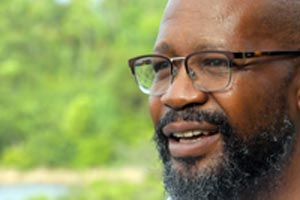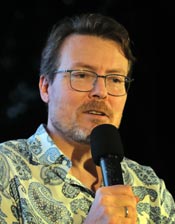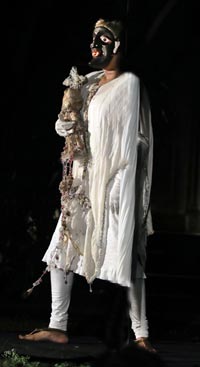The goal of a Fund and a better society through culture

Marcus Desando
Geoffrey Bawa’s country estate Lunuganga was the venue for maverick performances by eleven young cultural practitioners hailing from Myanmar to Batticaloa, when the Prince Claus Fund Biennial Symposium drew to a dramatic close after three dynamic days in Colombo and Bentota.
The performers did their abstract costumed dances, showcased avant-garde films, did quirky performance art acts and basically spoke out through art for a more equitable, peaceful, sustainable and inclusive future which is the goal of the Prince Claus Fund, that they aim to achieve purely through culture.
The Lunuganga award ceremony was the ‘meringue on the pudding’. On the previous two days there was many an event from dance performances at the BMICH to a symposium at the Park Street Mews, in collaboration with the Geoffrey Bawa Trust.
At the helm was Prince Constantijn of the Netherlands, to whose late father (Prince Consort to the dowager Queen Beatrix) is dedicated the fund.

Prince Constantijn
The Sunday Times sat down to talk with Marcus Desando, director of the fund, down from the Netherlands with the Prince, on their work, progress and the future.
This, he said, is their first biennial symposium, and they will continue work in the global south – basically concentrating on Africa, most parts of Asia, Latin and South America and some countries of Eastern Europe.
Marcus, 51, chatty and friendly, calls himself a ‘product of cultural practices’. He has not effaced from his memory that he grew up in apartheid South Africa. It was getting into music, and finally ending up as a top opera singer and director, that changed what would otherwise have been a less productive and salubrious life.
Opera for Marcus was life-altering and this he holds up as an example of how culture can not only change individuals but societies and countries as well. While when he began as a singer 99% of singers in South Africa were white, today most are black. He is proud to say that there are some 50 South African opera singers across the world now. Democracy has been brought about through culture.

Nonchi to the fore: An item at the dramatic finale of Prince Claus Fund Biennial Symposium. Pix by M.A. Pushpa Kumara
In a world where information can be polarising cultural practitioners have the knack to go “right to the root of the issue” says Marcus.
“They really address the social ills that they find themselves in and we really think that it’s a powerful tool for global challenges whether in a micro-level or a macro-level.”
The Fund thus strives to help such practitioners better their work, whether it’s for buying equipment for their practices or paying the people they work with, or even just sometimes being able to have a secure home or income for a period while they work.
They also look to create platforms for cultural practitioners to be able to learn from some of their own peers in how they can be of benefit.
Says Marcus, “We believe in the fact that people from the global south have more knowledge and because they have dealt with a lot of challenges that the north doesn’t necessarily have to grapple with on a day-to-day basis, and we want to emphasise that the knowledge from the south is as important, if not more important, in terms of how we deal with global challenges”.
Marcus has words of insurance for Sri Lanka: “If tourism is entrusted to the communities of different areas of the country and not be glossed over by political mandates, but really about how it can benefit people, then culture could be a great contributor.”
The participants were many and varied. From architect Channa Daswatte, filmmaker Anomaa Rajakaruna and such international figures as Shahidul Alam, it was a masala of many colourful elements mixing, and a truly inspiring biennial.
| Using traditional character to talk of gender issues | |
 Chathuri Nissansala, a young awardee used the masked character Nonchi from traditional Southern province drama to speak about gender issues at the Prince Claus ceremony. Chathuri Nissansala, a young awardee used the masked character Nonchi from traditional Southern province drama to speak about gender issues at the Prince Claus ceremony. “I use paintings, sculptures, traditional textiles and performances and recurring themes are inter-generational trauma and the idea of queer ecologies… I am making speculative alternative discourses- a simple example would be the Sigiri apsaras whom we call women but Coomaraswamy and Bell called Kinnaras or ‘transgender women’ (sic).” Varuni Perera, choreographer and performance artist, was a key performer at the public opening and said her act, ‘Whose history is it, anyway?’ was inspired by the 2019 book The Archive of Memory- Reflections of 70 years of Independence. Done in memory of Malathi de Alwis, co-performers came from Badulla, Horana, Jaffna, Batticaloa, Vavuniya and Negombo.
|
Searching for an ideal partner? Find your soul mate on Hitad.lk, Sri Lanka's favourite marriage proposals page. With Hitad.lk matrimonial advertisements you have access to thousands of ads from potential suitors who are looking for someone just like you.


